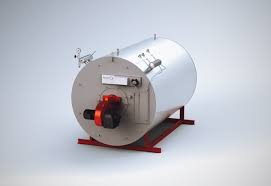
11월 . 27, 2024 05:48 Back to list
Thermal Fluid Heating Systems for Industrial Applications and Efficient Energy Solutions
Understanding Thermic Fluid Oil Boilers An Essential Component in Industrial Heating
In various industrial processes, maintaining precise temperature control is crucial for ensuring product quality and operational efficiency. Thermic fluid oil boilers emerge as a vital solution to meet these heating demands, offering a range of advantages over conventional steam boilers. This article delves into the principles, benefits, applications, and maintenance of thermic fluid oil boilers.
What is a Thermic Fluid Oil Boiler?
A thermic fluid oil boiler is a type of thermal boiler designed to heat a specialized fluid, typically organic thermal oils, to high temperatures. Instead of converting water into steam for heating purposes, these boilers circulate thermal fluid that can maintain stable temperatures without undergoing phase changes. This unique approach allows for efficient heat transfer and better thermal management in various industrial settings.
How Does It Work?
The operation of a thermic fluid oil boiler revolves around a simple principle heating an organic thermal fluid in a closed loop. The process begins with the boiler heating the fluid to the desired operating temperature, usually between 150 °C to 400 °C (302 °F to 752 °F). Once heated, this fluid is circulated through a series of heat exchangers or directly connected to the processes requiring heating. The thermal fluid absorbs heat and transfers it to the desired application, such as reactors, dryers, or heat exchangers.
One of the key advantages of using thermal fluids is the ability to operate at high temperatures without excessive pressure. This characteristic not only enhances safety but also allows industries to utilize the heat more efficiently, minimizing heat loss and improving overall productivity.
Benefits of Thermic Fluid Oil Boilers
1. Efficiency Thermic fluid oil boilers are highly efficient in transferring heat compared to traditional water boilers. The thermal oils maintain their temperature for longer periods, providing consistent heat with minimal energy consumption.
2. Versatility These boilers can be used across a wide range of applications, including chemical processing, food production, textiles, and plastics. The ability to maintain precise temperatures makes them suitable for various heating and processing requirements.
thermic fluid oil boiler

3. Safety Operating with thermal oils significantly reduces the risk of explosions and accidents associated with high-pressure steam systems. The closed-loop operation minimizes leaks and enhances overall safety in temperature-sensitive environments.
4. Low Maintenance Thermic fluid oil boilers generally require less maintenance than steam boilers. The thermal fluid does not require frequent replacement, and the system design minimizes wear and tear, leading to reduced operational downtime.
5. Environmental Impact Many modern thermic fluid oil boilers can use environmentally friendly thermal fluids, thus contributing to sustainability efforts. Additionally, they can often be integrated with renewable energy sources, such as biomass or solar, to further enhance their eco-friendliness.
Applications of Thermic Fluid Oil Boilers
The versatility of thermic fluid oil boilers allows them to be utilized in a myriad of industries. For instance, they are commonly found in
- Food Processing Maintaining consistent temperatures in cooking, drying, and food preservation processes. - Chemical Production Providing heat for the synthesis of chemicals, where maintaining specific temperatures is critical. - Textile Manufacturing Heating dyes and fabrics during production processes. - Pharmaceuticals Ensuring precise temperature control for the production of medicines.
Maintenance Considerations
Although thermic fluid oil boilers are relatively low-maintenance, regular inspections and servicing are essential to ensure efficient operation. Key maintenance tasks include checking fluid levels, monitoring temperature and pressure gauges, and inspecting for leaks or wear in piping and fittings. Regular fluid analysis can also help detect any contamination or degradation, ensuring the longevity of the system.
In conclusion, thermic fluid oil boilers play a critical role in modern industrial heating applications. Their ability to provide efficient, safe, and consistent heating makes them a preferred choice across various sectors. With ongoing advancements in technology and an increasing focus on energy efficiency and sustainability, thermic fluid oil boilers are poised to remain integral in industrial heating solutions for years to come.
-
How to Maintain a Steam Boiler Expert Tips for Efficiency & Longevity
NewsApr.29,2025
-
Professional Steam Boiler Service AB Expert Maintenance & Repair
NewsApr.29,2025
-
Hot Water Steam Boilers Efficient Heating Solutions & Expert Tips
NewsApr.29,2025
-
Hot Water Boiler Capacity Calculation Guide Efficient Design Tips
NewsApr.28,2025
-
How to Drain a Steam Boiler Step-by-Step Safety Guide
NewsApr.28,2025
-
How to Install a Hot Water Boiler Optimal Pressure & Efficiency Guide
NewsApr.28,2025
Related PRODUCTS






















